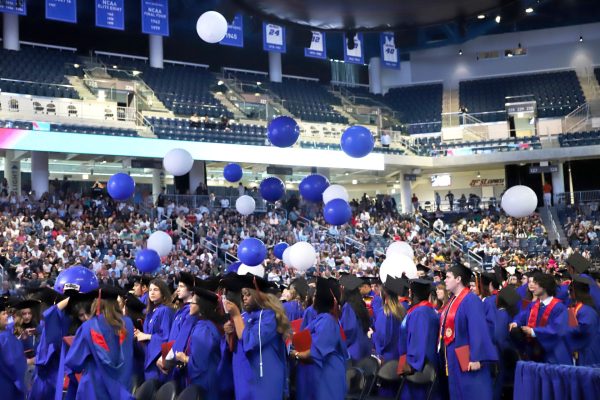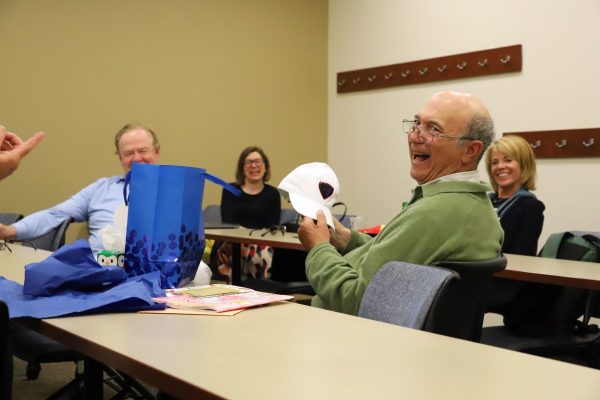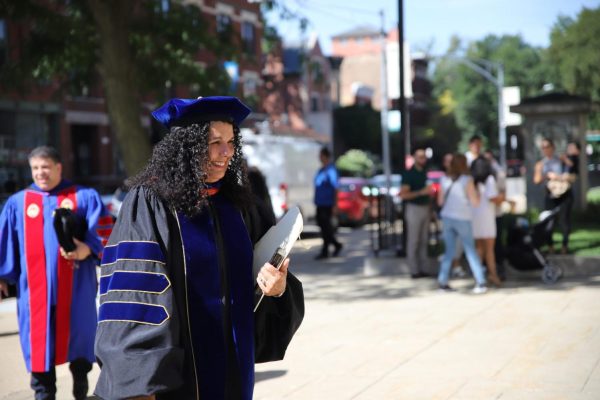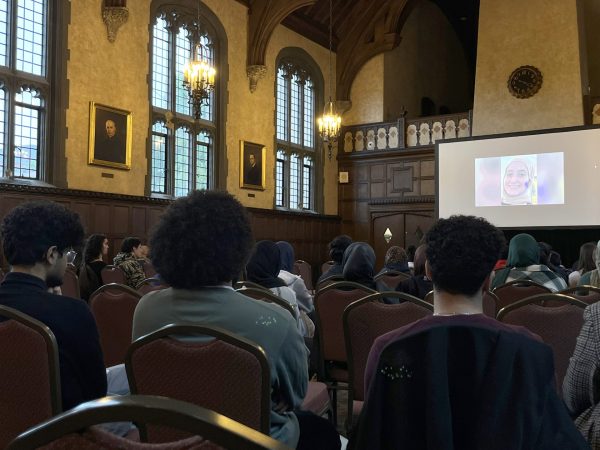Faculty Council raises concerns about lack of shared governance
Credit: Graphic by Ella Lee, images from Wikimedia Commons/The DePaulia
DePaul recently announced the approved budget for the upcoming two fiscal years, despite faculty concerns over the issue of shared governance outlined in the faculty handbook. On May 15, a memo sent to the Faculty Council budget committee outlined concerns over the approved budget and the budgetary process.
Tom Mondschean, economics professor and chair of the Faculty Council budget committee, wrote the memo with the help of Faculty Council members Scott Paeth, Ahmed Zayed and Bamshad Mobasher.
“[Shared governance] is sort of an agreement between us and the administration that says that we will respect one another’s areas of primary responsibility,” Paeth, president of Faculty Council, told The DePaulia. “Now, when it comes to the budget, the budget is not an area of the faculty’s primary responsibility, but it is an aspect of the faculty’s participatory responsibility.”
“In the case of the budget, what that means is that we have a voice, we have a place at the table, but we don’t necessarily have the final say,” he added.
The Faculty Council budget committee serves as liaison between the Faculty Council and the faculty members of the Strategic Resource Allocation (SRAC), provides assistance to those members and helps specify faculty priorities in the budgeting process, according to the Faculty Council website.
The memo lists several issues concerning shared governance, budgetary constraints and ambiguity in future procedures. The memo also outlines this year’s key changes in the budgetary process.
“The budget process this year was unique in several respects,” the memo reads. “It was several steps back from many years of shared governance between faculty, staff, students and university executives on both the academic and operations sides. Of particular concern is the way that discussions with the Board of Trustees Finance Committee unfolded resulting in a break with past shared governance traditions and undermining the role of SRAC as the representatives of the university community…”
The first point of contention the memo mentions is that the chair and former chair of the Faculty Council budget committee were permitted to attend SRAC budget hearings but not executive sessions, a change from previous years.
Zayed, math sciences professor and faculty council representative for the College of Health and Sciences, has served on the Faculty Council since 2008 and the Budget Committee since 2014. Zayed was the former chair of the faculty budget committee and participated in SRAC executive sessions in the past. He anticipated attending this year’s sessions, as former chairs have in the past; however, Zayed was informed that would not be the case.
“I’ve been serving on these committees and SRAC and faculty council Budget Committee for many years, and I’ve never seen anything like this before,” Zayed said. “For years, we were allowed to attend the meetings … but this year, they said no. Under a little bit of pressure, they relented a little bit and said okay, the non-voting members can attend the meetings, but they cannot ask any questions.”
Additionally, for the first time ever, DePaul’s board of trustees directed SRAC to approve budgets for the upcoming two fiscal years, instead of one.
Normally, the budget committee drafts a budget for the upcoming fiscal year. Members pointed out that forecasting future revenues is especially difficult given the financial turmoil caused by pandemic.
“It is one thing to forecast revenue one year in advance under these conditions; to try to forecast two years out makes no sense on rational economic grounds,” the memo reads. “Now that the Board has approved budgets for the next two years, we may have little if any voice in determining, for example, what happens if revenues are significantly higher than forecasted once the vaccination programs allow us to return to normality.”
Also, for the first time, gift and grant revenue were excluded from the budget process.
“We worked in the strategic plan to try to increase gifts and grants to reduce the dependence on tuition,” Mondschean said. “Now that we’ve actually started showing gifts and grants are up a lot, they’re taking it away … which is contradictory to what our plan was supposed to do. So that’s troubling to me.”
“Probably for the faculty, the most difficult thing is the under investing on new faculty lines for tenure track, because that’s where our best faculty come from, and [these] faculty come to DePaul with new ideas, and replacing them with term faculty or adjunct who teach occasionally is gradually over time going to diminish our quality, and there’s no end in sight,” Mondschean added. “The idea of the trustees is to keep the university on good financial footing by saving as much as possible [and] putting in the endowment for the future … but it means you’re not investing enough now and students are kind of being overcharged to help support the endowment.”
The Board of Trustees also made changes to the school’s return to principal, which concerns revenue from DePaul’s endowment.
In past years, the endowment pull has been 4.5 percent, where some of that money goes back to the endowment — referred to as the return to principal. The school has a policy of returning the majority back into the endowment; however, DePaul took a two-year hiatus from returning the majority of endowment funds due to the pandemic.
“… We’re not going to do a return to principal [this year], which is several million dollars of additional resources …” Mondshean said. “But the year after, we’ll have to start doing it again and we’re doing half of what is normal, and we argue that that was premature.”
Moreover, despite the unanimous vote by SRAC, their initial proposed budget was rejected by President A. Gabriel Esteban and was not sent to the Finance Committee of the Board. SRAC was not informed of this fact until after the Finance Committee meeting, according to the memo.
Each year the budget committee proposes two budgets to Esteban and the Board of Trustees, the latter budget being more austere. Esteban and the board consider both budgets and communicate any desired changes to SRAC before the final approval. However, this year, Esteban only sent the more austere budget B to the board, to which they made additional cuts without informing SRAC, contradictory to past practices.
“That’s really where the point of contention comes in,” Paeth said. “When it comes to shared governance, [we] believe that we had the right to be involved in the decision about what that final budget looks like and that we weren’t properly consulted on that.”
The memo also calls the board’s additional budget constraints into question.
“I do not want to give the impression that anybody thinks that DePaul University is experiencing a financial crisis,” Paeth said. “… [The board thinks] that if we do not make adjustments now, then [years] from now, we will find ourselves in a situation where we have unsustainable budgets … The board’s attitude is we need to do these things now, in order to avoid a crisis then.”
Mondschean pointed out that a continuation of budget cuts may affect DePaul’s reputation in the future.
“Part of what we’re concerned about is what is the university going to look like in 10 years after doing all this?” Mondschean said. “[Will this be] a university that a lot of people want to go to … There’s some real issues out here that faculty are really scared about and students should be too.”
“What’s new is that the governance has broken down … but the austerity kick has been going on for quite a while,” he added. “Right now, we’re feeling like the university is moving in one direction and saying one thing, and the faculty are saying other things — and the university does not pay attention. They do what they want to do.”
In the past, faculty have also raised concerns about shared governance, including during last year’s provost search. Despite the Faculty Council’s desire to implement a nationwide provost search, Esteban appointed Salma Ghanem as provost without opening the search to national candidates.
Changes in administration may have contributed to this year’s inconsistencies in the budgetary process including the death of Lori Holland, former chair of the Board of Trustees, last year, and the resignation of Jeff Bethke, DePaul’s former chief financial officer.
On Wednesday, DePaul’s Faculty Council limited meeting access only to faculty in order to allow for frank discussion and deliberation, according to Paeth. The virtual meeting exceeded Zoom’s capacity limit, and some members were unable to attend.
“The fact that we had more than 300 people interested in the meeting willing to show up on relatively short notice, and to listen and to participate in this meeting shows that people are very concerned about the future of the university, about our budgetary situation, and about these issues of shared governance that we’re raising,” Paeth said. “One thing that I think is really important for the administration to hear is that faculty are very motivated and energized by these issues and they care deeply about them.”
Also on Wednesday, the budget committee sent an official statement to faculty, outlining the concerns from Mondschean’s May 15 memo.
FCBC Resolution to FC 051721 by DePaulia on Scribd
“The Faculty Council presents these facts and strongly condemns the steps taken by President Esteban and the Board of Trustees Finance Committee that undermined shared university governance in budgetary matters this year,” the statement reads. “We stand with our SRAC representatives and call on President Esteban, the Finance Committee of the Board of Trustees, and the Trustees of DePaul University to respect shared governance in all areas of the university and to follow past practice in the budgetary process.”
A council of the whole — a special kind of faculty meeting, in which all full-time faculty have the right to vote — is set to take place sometime this fall to further discuss faculty concerns. Before the meeting, the Faculty Council executive committee will meet to discuss possible motions to be considered at the council of the whole.
As the Board of Trustees has the final say in the upcoming budget, faculty members highlight that the process should reflect the Vincentian mission as it relates to shared governance.
“I think we all at the end of the day, we’re here because we believe in one form or another in the Vincentian mission,” Paeth said. “… That is what we need to constantly be sort of calling back to, when it comes to these issues of shared governance, is we constantly need to be grounding ourselves in that sense of shared mission. We want DePaul and its administration to show us that they are committed to DePaul’s mission as we are.”











